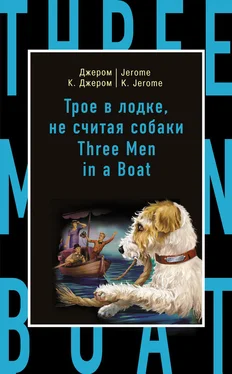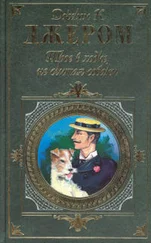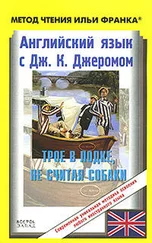“Why, who told you I caught that trout!” was the surprised query.
We said that nobody had told us so, but somehow or other we felt instinctively that it was he who had done it.
“Well, it’s a most remarkable thing – most remarkable,” answered the stolid stranger, laughing; “because, as a matter of fact, you are quite right. I did catch it. But fancy your guessing it like that. Dear me, it’s really a most remarkable thing.”
And then he went on, and told us how it had taken him half an hour to land it, and how it had broken his rod. He said he had weighed it carefully when he reached home, and it had turned the scale at thirty-four pounds.
He went in his turn, and when he was gone, the landlord came in to us. We told him the various histories we had heard about his trout, and he was immensely amused, and we all laughed very heartily.
“Fancy Jim Bates and Joe Muggles and Mr. Jones and old Billy Maunders all telling you that they had caught it. Ha! ha! ha! Well, that is good,” said the honest old fellow, laughing heartily. “Yes, they are the sort to give it ME, to put up in MY parlour, if THEY had caught it, they are! Ha! ha! ha!”
And then he told us the real history of the fish. It seemed that he had caught it himself, years ago, when he was quite a lad; not by any art or skill, but by that unaccountable luck that appears to always wait upon a boy when he plays the wag from school, and goes out fishing on a sunny afternoon, with a bit of string tied on to the end of a tree.
He said that bringing home that trout had saved him from a whacking, and that even his school-master had said it was worth the rule-of-three [96]and practice put together.
He was called out of the room at this point, and George and I again turned our gaze upon the fish.
It really was a most astonishing trout. The more we looked at it, the more we marvelled at it.
It excited George so much that he climbed up on the back of a chair to get a better view of it.
And then the chair slipped, and George clutched wildly at the trout-case to save himself, and down it came with a crash, George and the chair on top of it.
“You haven’t injured the fish, have you?” I cried in alarm, rushing up.
“I hope not,” said George, rising cautiously and looking about.
But he had. That trout lay shattered into a thousand fragments – I say a thousand, but they may have only been nine hundred. I did not count them.
We thought it strange and unaccountable that a stuffed trout should break up into little pieces like that.
And so it would have been strange and unaccountable, if it had been a stuffed trout, but it was not.
That trout was plaster-of-Paris [97].
Locks. – George and i are photographed. – Wallingford. – Dorchester. – Abingdon. – A family man. – A good spot for drowning. – A difficult bit of water. – Demoralizing effect of river air.
We left Streatley early the next morning, and pulled up to Culham, and slept under the canvas, in the backwater there.
The river is not extraordinarily interesting between Streatley and Wallingford. From Cleve you get a stretch of six and a half miles without a lock. I believe this is the longest uninterrupted stretch anywhere above Teddington, and the Oxford Club make use of it for their trial eights.
But however satisfactory this absence of locks may be to rowing-men, it is to be regretted by the mere pleasure-seeker.
For myself, I am fond of locks. They pleasantly break the monotony of the pull. I like sitting in the boat and slowly rising out of the cool depths up into new reaches and fresh views; or sinking down, as it were, out of the world, and then waiting, while the gloomy gates creak, and the narrow strip of day-light between them widens till the fair smiling river lies full before you, and you push your little boat out from its brief prison on to the welcoming waters once again.
They are picturesque little spots, these locks. The stout old lock-keeper, or his cheerful-looking wife, or bright-eyed daughter, are pleasant folk to have a passing chat with. [98]You meet other boats there, and river gossip is exchanged. The Thames would not be the fairyland it is without its flower-decked locks.
Talking of locks reminds me of an accident George and I very nearly had one summer’s morning at Hampton Court.
It was a glorious day, and the lock was crowded; and, as is a common practice up the river, a speculative photographer was taking a picture of us all as we lay upon the rising waters.
I did not catch what was going on at first, and was, therefore, extremely surprised at noticing George hurriedly smooth out his trousers, ruffle up his hair, and stick his cap on in a rakish manner at the back of his head, and then, assuming an expression of mingled affability and sadness, sit down in a graceful attitude, and try to hide his feet.
My first idea was that he had suddenly caught sight of some girl he knew, and I looked about to see who it was. Everybody in the lock seemed to have been suddenly struck wooden. They were all standing or sitting about in the most quaint and curious attitudes I have ever seen off a Japanese fan. All the girls were smiling. Oh, they did look so sweet! And all the fellows were frowning, and looking stern and noble.
And then, at last, the truth flashed across me, and I wondered if I should be in time. Ours was the first boat, and it would be unkind of me to spoil the man’s picture, I thought.
So I faced round quickly, and took up a position in the prow, where I leant with careless grace upon the hitcher, in an attitude suggestive of agility and strength. I arranged my hair with a curl over the forehead, and threw an air of tender wistfulness into my expression, mingled with a touch of cynicism, which I am told suits me.
As we stood, waiting for the eventful moment, I heard someone behind call out:
“Hi! look at your nose.”
I could not turn round to see what was the matter, and whose nose it was that was to be looked at. I stole a side-glance at George’s nose! It was all right – at all events, there was nothing wrong with it that could be altered. I squinted down at my own, and that seemed all that could be expected also.
“Look at your nose, you stupid ass!” came the same voice again, louder.
And then another voice cried:
“Push your nose out, can’t you, you – you two with the dog!”
Neither George nor I dared to turn round. The man’s hand was on the cap, and the picture might be taken any moment. Was it us they were calling to? What was the matter with our noses? Why were they to be pushed out!
But now the whole lock started yelling, and a stentorian voice from the back shouted:
“Look at your boat, sir; you in the red and black caps. It’s your two corpses that will get taken in that photo, if you ain’t quick.”
We looked then, and saw that the nose of our boat had got fixed under the woodwork of the lock, while the in-coming water was rising all around it, and tilting it up. In another moment we should be over. Quick as thought, we each seized an oar, and a vigorous blow against the side of the lock with the butt-ends released the boat, and sent us sprawling on our backs.
We did not come out well in that photograph, George and I. Of course, as was to be expected, our luck ordained it, that the man should set his wretched machine in motion at the precise moment that we were both lying on our backs with a wild expression of “Where am I? and what is it?” on our faces, and our four feet waving madly in the air.
Our feet were undoubtedly the leading article in that photograph. Indeed, very little else was to be seen. They filled up the foreground entirely. Behind them, you caught glimpses of the other boats, and bits of the surrounding scenery; but everything and everybody else in the lock looked so utterly insignificant and paltry compared with our feet, that all the other people felt quite ashamed of themselves, and refused to subscribe to the picture.
Читать дальше
Конец ознакомительного отрывка
Купить книгу









